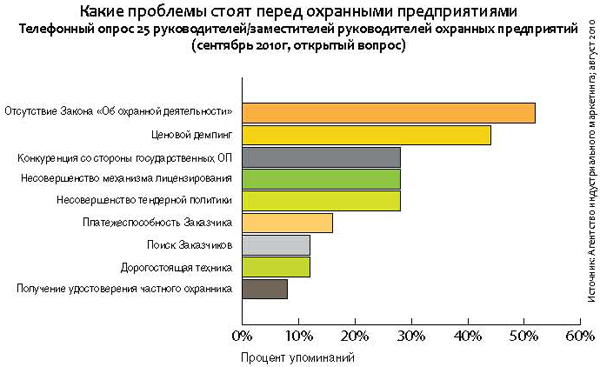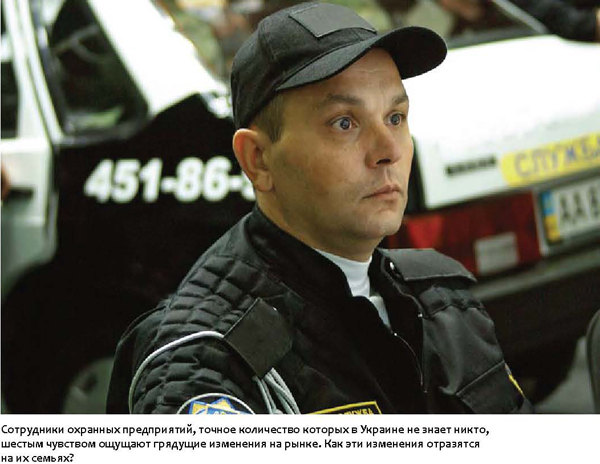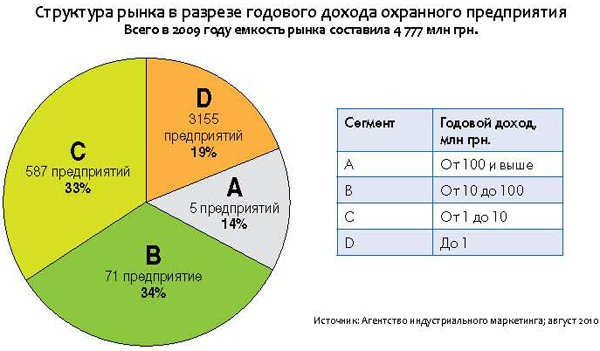SHAMEFUL AND SCARY
Authors: Alexander Krasnoperov, Antonina Filonenko, Security USA
The situation in which the domestic security market finds itself can figuratively be called “revolutionary”: both the state regulator (also the dominant player in the market) and private security companies are convinced almost every day that the current regulatory system has outlived its usefulness and does not allow anyone to progress. Security USA took the liberty of predicting the situation for the near future. Shame and fear: alternatives to civilized security market development. The current situation in which the Ukrainian security market finds itself can be called revolutionary: the state regulator (a market player at the same time) and private security companies are convinced that the existing regulation system is outdated and therefore, it hinders progress. SECURITY.UA dares to make prognosis on the most probable scenario. Market. The beginning of the journey
Any forecast has every chance of failure if it is not tied to the retrospective. Therefore, let us allow ourselves to dwell on the early stages of the formation of the security market.
It is known that back in the late 80s of the last century, the Technical Committee for Private Security of the Ministry of Internal Affairs of the USSR developed a model for building a state security service headed by a civilian leader. At that time, a similar model had already been tested in the Baltic republics, however, for obvious historical reasons, the matter was not completed. After 1991, each former Soviet republic began to look for its own path.
In Ukraine, two years after gaining independence, Cabinet Resolution No. 615 appeared, legalizing the State Security Service under the Ministry of Internal Affairs of Ukraine. This Resolution gave the Ministry of Internal Affairs the go-ahead to earn money on a contractual basis by protecting property and citizens.
The founders of the State Security Service realized the harmfulness of this approach, but they could not do anything: the Ministry of Internal Affairs, like other structures at that time, was struck by the virus of financial insolvency. But the founding fathers reassured themselves that the State Security Service was a temporary structure, because their next idea was the privatization of security departments, turning them into private enterprises (but “from below” and not “from above” — as was done later when creating JSC “ Security complex»). In addition, with the development of legislation on municipal police, all armed units of the State Security Service were supposed to be transferred to the city authorities, and the monitoring and, in part, response functions were to be farmed out to private security firms. And the Service itself was intended to carry out exclusively coordination and control functions.
It just so happens that nothing is as permanent as temporary. The stage called “GSO” dragged on. The created structure never became an authoritative coordinating body. Moreover, the Security Service has gone headlong into making money. Veterans of the Service recall how in the mid-90s it came to the point that police squads officially, according to contracts, protected the leaders of organized criminal groups.
Lacking a powerful state ideological core, the GSO system was made dependent on the will and sentiments of one or another ministry leader. More precisely, on the ability of an official endowed with power to resist the temptations and corrupting factor of big money.
Years later
According to statistics, the number of security companies in Ukraine increased from 1005 in 2001 to 3818 in 2009. Last year, almost a third of enterprises, 28%, were registered in Kyiv, 8% in Donetsk, 6% each in Odessa, Lvov and Dnepropetrovsk. The rest are more or less evenly distributed throughout the country. However, official statistics do not reflect the real picture, since in one region up to a dozen firms can be registered per person, which can be considered the desire of the owners to receive additional guarantees for the continuation of business in the event of the deprivation of the license of one of the firms.
In general, until today in Ukraine no one has conducted a comprehensive and large-scale study of the structure, capacity and dynamics of the security market. The only reliable research can be considered the work of the Industrial Marketing Agency, whose specialists estimated the integrated “white” income of the private security market for 2009 in the amount of 4.77 billion hryvnia (which, by the way, is approximately 5 times more than in 2002).
According to the Agency, the structure of the market is such that, based on the results of the last financial year, 5 companies (not counting GSO) cover 14% of the total market turnover. 71 enterprises, earning from 10 to 100 million UAH. per year, responsible for 34% of annual turnover. Almost the same amount was earned by 587 companies with an annual turnover of 1 to 10 million UAH. The remaining 19% of the market accounts for almost three thousand security companies (see chart).
According to the Ukrainian Institute of Public Policy, the annual volume of SSO services is about 1 billion UAH. According to Security USA, this amount is underestimated by more than 2 times, and the figure of 2.4 billion may be considered more accurate.
Thus, we can assume that only the “white” volume of the security services market in Ukraine today is approaching the “$1 billion” mark. If we take France for comparison, then in 2008 the annual turnover of the security market there amounted to 18 billion euros (this figure is provided by the US Department of Commerce on the website buyusa.gov). France, with its 65 million population, can serve as a kind of indicator of the potential total, “white” and “black” capacity of the Ukrainian market and lead researchers to a figure of 15 billion dollars.
These figures explain the many years of delay in the adoption of the rules for dividing the security “pie”. And the crisis, which forced the oligarchs to count every million, aggravated this delay. But this cannot continue indefinitely. One of the public leaders of the security industry has already publicly declared his readiness, if necessary, to organize street protests. For Security USA, it is already obvious that 2011 will put a lot of things into place, and the market will develop according to one of the scenarios below.
Scenario 1. Shame
Let us assume that, despite criticism, outrage and even street protests, the odious Law “On Security Activities” was adopted in its current form. Having become a “monopolist in law” and the legal “breadwinner” of the ministry, the GSO will confidently take over about 70% of the market. The powers of the Ministry of Internal Affairs in the field of licensing, expanded by the Law, will certainly help her in this. Considering the increasing role of the technical factor, considerable cash flows are promised from the voluntary-compulsory certification of security equipment. At the same time, certification will not fulfill its main function — protecting consumers from unscrupulous producers, and businesses from unfair competition. Market regulation will be carried out “manually”. Prescribed in Art. 20 of the bill, the Expert Council will work “to the tune” of the Ministry of Internal Affairs, since the business of its members on the part of the public will depend 100% on the orders of officials. There will be what the head of the USPP Anatoly Kinakh recently called “an unprecedented scale of corruption and “pinching,” promising to submit the “security” issue for consideration by the National Anti-Corruption Committee under the President of Ukraine.
Scenario 2. Scary
In the “scary” scenario, the state admits that it has made unforgivable mistakes in regulating the security market and reorganizes the State Security Service. The response units will be transferred either to the municipal police or to the patrol service. The material assets of the State Security Service will be privatized according to cunning schemes by one of the oligarchs close to the ruling party. By quickly writing the necessary laws and standards “for himself,” this oligarch will be able to control up to 85% of the security market through his commercial structures. At the same time, the issue with weapons will be resolved very quickly, but it will be extremely difficult for the remaining 15% to get them, since politics will directly connect to the economy: security companies will become the armed detachment of the ruling party.
Agree, against the backdrop of this seemingly unrealistic scenario, all the round tables, coordination councils and finding out “who is the main dumper on the market” look like children's games in the sandbox. But is this scenario really that unrealistic?  Scenario 3. Civilized, but risky
Scenario 3. Civilized, but risky
Privatization of security is a global trend. This is confirmed by such authoritative sources as reports from the European Commission and the UN Office on Crime and Drugs. Private companies in many countries take over the protection of government facilities that are traditionally considered to be particularly important.
For example, in the USA, “private contractors” guard both nuclear power plants and prisons. In Great Britain, Germany, and Sweden, the ministries of internal affairs include in their budgets the costs of the services of private security companies. In these and other countries, professional market associations are delegated regulatory functions that the state previously tried to perform.
Ukraine, in principle, does not fall out of this trend: both statesmen and many businessmen are consciously inclined towards the idea of self-regulation. The draft Law “On Self-Regulatory Organizations” promises SROs such powers as training specialists, voluntary certification, development and approval of standards, issuing permits for the right to engage in professional activities, etc.
The President of the Ukrainian Federation of the Security Industry, Oleg Baran, recently noted that, having relied on the state, the market did not receive clear and transparent rules and regulations for doing business. The head of the UFIB expressed confidence that today or tomorrow self-regulation mechanisms will already be launched, and that the competitiveness of companies will be determined not in closed offices, but in a transparent professional format.
Mr. Baran’s colleague, President and Chairman of the Board of the Ukrainian Union of Fire and Technological Safety Boris Platkevich, apparently also places a lot of hope on self-regulation. At the International Conference held in Yalta in early October, this topic was repeatedly raised as a subject of interested discussion with colleagues from Germany, Poland, Hungary, the Czech Republic, and Slovakia. In Yalta, Boris Stanislavovich initiated the development of a standard for his industry as one of the future main SRO standards, and market participants for the most part supported him.
It would seem that scenario No. 3 is a panacea. But there are also side effects. If large, systemically important market enterprises suddenly refuse to join a self-regulatory organization, then this scenario could turn into a disaster. In addition, based on the traditions of Ukrainian business, one of the main threats to self-regulation should be considered the creation of a new, but public, corruption model.
An equally dangerous threat to self-regulation is sabotage from inert and dishonest officials. By the way, neither the Ministry of Internal Affairs nor the Ministry of Emergency Situations of Ukraine has yet officially expressed their position regarding the possible receipt by their licensees of the above liberties.
Interim conclusions
How It wouldn’t be embarrassing or scary, but conclusions must be drawn. And they are as follows:
1. The security market has become “overripe” in the tedious wait for fair and unambiguous rules of the game; Understanding this, the state will soon turn its attention to regulating the security business. It is possible that the State Security Service Department under the Ministry of Internal Affairs of Ukraine will be reorganized into a state security company for (as an option) subsequent privatization in whole or in parts. If the described option has the right to life, then the future real owner of the security monopoly will somehow reveal itself before the end of this year. For example, he himself or through someone at the top will act as a “locomotive” for the implementation of System 112 and/or initiate a certain State program for the development of telecommunications.
2. Considering that the privatization of the security sector is not only a pan-European, but also a global trend, the state will create the appearance of self-regulation in certain segments of the security industry. Most likely, the relaxations will affect the sector of technical security equipment, while security activities themselves and the issue of weapons will remain under the close attention of those in power.
3. The self-organizing energy of many professional public associations in the security industry will remain unclaimed until better times.
STOP panic

However, these intermediate conclusions should in no case throw true security market professionals into panic (especially since even 15% of 15 billion is, some kind, 2.25 billion dollars).
People’s desire to live better and safer is difficult to curb. Even communists are unlikely to want to live by the standards of the USSR. Therefore, little by little, regardless of the above scenarios, the Western model of security business will develop in Ukraine — with the predominance of technical means of security over physical security, with mandatory liability insurance and with the provision of a whole range of related services — legal, analytical, personnel and even cleaning. Market realities will force security firms and small businesses to think about merging. Larger structures will inevitably become shareholders of medium and small companies and transfer their services to the category of networks. And then, God willing, no one will be either afraid or ashamed.
